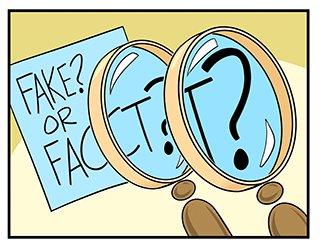Fact Checking Sites: FactCheck.Org

Since 2003, journalists, researchers, and editors at FactCheck.org have fought to slow the spread of disinformation by researching claims in TV ads, debates, speeches, interviews, and news stories.[1] Dedicated to helping voters access factually correct information, FactCheck.org is a project of the Annenberg Public Policy Center at the University of Pennsylvania.
As an institution committed to the principles of journalism, FactCheck.org clearly outlines their processes. The site strives to remain politically neutral and claims to spend the same amount of time reviewing claims on both sides of the aisle. After scouring presidential speeches, Sunday news programs, campaign websites, press releases, and the like, their team of fact checkers gets to work verifying the sources’ credibility.[2]
Fact checkers begin by verifying transcripts and videos. If a claim seems unsound, they contact the source of the claim to see where they got their information. If the source is unable to answer the question, the fact checkers conduct research of their own, drawing mostly from primary sources from nonpartisan government agencies.
When the research phase is complete, the debunkers then begin composing an article that details the false claim and the evidence that refutes these claims. Once a draft is composed, it goes through several layers of editing. First, a line editor ensures that the story contains the proper content, context, and word choice. Next, a copy editor reviews the article’s grammar and style. After the essay has been checked for surface-level issues, a fact checker then inspects the article sentence-by-sentence and word-by-word to certify that the article is correct. Finally, the director of the FactCheck.org approves the article. By the time this whole process is complete, approximately four people who neither wrote, nor researched the article have ensured its accuracy.[3]
FactCheck.org is also transparent about its funding sources. Before 2010, the site received funding from three sources – the Annenberg Public Policy Center, the Annenberg Foundation, and the Flora Family Foundation. That year, FactCheck.org started accepting donations from the public. The site discloses the name of donors who contribute over $1,000 to the site and have received many awards for their disclosure policy.[4]
With one notable exception, the site does not accept donations from companies or political organizations. FactCheck.org receives a small amount of money from Facebook, but the organization notes that “Facebook has no control over our editorial content.”[5]
In this age of disinformation, FactCheck.org works diligently to ensure that voters can make informed choices. This invaluable resource aims to “apply the best practices of both journalism and scholarship, and increase public knowledge and understanding.”[6] The hard work and dedication of these writers and researchers have merited numerous awards, including four Webby awards in the Politics category and recognition as one of Time Magazine’s “25 Websites We Can’t Live Without.”[7]
[1] Editorial Staff at FactCheck.org, “Our Mission,” FactCheck.org.
[2] Editorial Staff at FactCheck.org, “Our Process,” FactCheck.org.
[3] Editorial Staff at FactCheck.org, “Our Process,” FactCheck.org.
[4] Editorial Staff at FactCheck.org. “Our Funding,” FactCheck.org.
[5] Editorial Staff at FactCheck.org, “Our Funding,” FactCheck.org.
[6] Editorial Staff at FactCheck.org, “Our Mission,” FactCheck.org.
[7] Editorial Staff at FactCheck.org, “Awards,” FactCheck.org.
